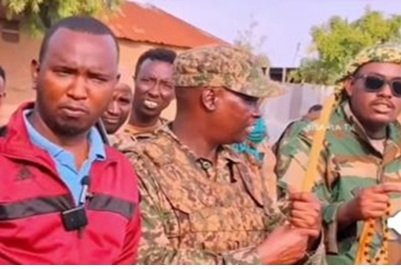By Abdullahi Ahmed Nor
In a country where insecurity remains a daily reality for millions, the language of war has become disturbingly casual. Recently, the District Commissioner of Janaale Abdirahman Al-adala made international headlines by threatening to summarily execute any individual accused of working with Al-Shabaab or possessing explosives—without recourse to courts or legal process.
The commissioner’s comments came during a military sweep in which hundreds of young men were forcibly removed from their homes and assembled in a public square under armed guard. He warned them—and by extension, all residents of Janaale—that “anyone found with a landmine, hand grenade, or linked to Al-Shabaab will be publicly executed, no trial required.”
He also declared that any home where explosives were discovered would be immediately confiscated by the federal government.
This rhetoric is as reckless as it is unlawful.
The notion of executing suspects without trial not only violates the Constitution of Somalia but flies in the face of international human rights standards to which Somalia is a signatory. More troubling, however, is the fact that this is not an isolated outburst—it is part of a broader pattern of governance failure that has taken root across southern and central Somalia.
Since the federal government launched its heavily publicized campaign to eliminate Al-Shabaab in 2024, communities across the country have heard more bluster than seen results. Leaders promise victory. Districts are declared “liberated.” But time and again, the reality tells a different story: the same towns fall back under insurgent control, while ordinary people continue to suffer at the hands of both terrorists and the very government meant to protect them.
A War Without Strategy
The so-called “total war” against Al-Shabaab, spearheaded by President Hassan Sheikh Mohamud, was designed to project strength and resolve. Instead, it has exposed the lack of a coherent strategy. In Lower Shabelle, military operations are frequent but shallow. Intelligence gathering is weak. Coordination between federal and regional forces is fragmented, and abuses by security officials often go unpunished.
Nowhere is this failure more visible than in the leadership’s resort to public threats, humiliation, and extra-judicial language—an approach that does little to deter extremism and much to alienate communities.
The recent episode in Janaale is deeply emblematic. Rather than build trust with citizens and foster local cooperation, government officials choose to govern through fear, detention, and dehumanization. This not only violates the social contract but actively fuels radicalization.
Hirshabelle: Another Case Study in Breakdown
Further north, the same dysfunction plays out in Hirshabelle, a federal member state still reeling from decades of instability and underdevelopment. Towns like Jowhar and Beledweyne remain surrounded by Al-Shabaab, who collect taxes in broad daylight and control the movement of people and goods. The state government, meanwhile, barely functions. Its officials remain confined to narrow perimeters—unable or unwilling to engage communities beyond their compounds.
In 2023, a major offensive was declared in Hiraan region with much fanfare. Yet by mid-2025, most of the territory allegedly “liberated” had been retaken by Al-Shabaab, or never fully cleared in the first place. Several forward operating bases (FOBs) were abandoned due to poor logistics, desertions, or lack of air support. Fighters who once joined the government-backed Ma’awisley militias were left unpaid and disillusioned—some even switching sides.
This is not a war for hearts and minds. It is a war of press releases, photo ops, and shallow engagements. Community elders in Hirshabelle complain bitterly that federal authorities only arrive when they need bodies for the battlefield or votes in parliament.
Just like Janaale, the people of Hirshabelle are caught between extremists and a state that acts more like an occupier than a partner.
No Lessons Learned
Despite these consistent patterns, Somali leadership seems unwilling to change course. In the words of one regional security analyst, “It’s like watching the same bad play every year, with a few new actors but the same tired script.”
Instead of building strong local administrations, investing in inclusive governance, or equipping the judiciary to process security cases legally and fairly, officials continue to militarize every problem. They issue ultimatums. They hold press conferences. They declare “total war.” And when that fails, they blame the public for not doing enough.
This endless cycle of empty declarations has now led us to a place where district commissioners openly threaten to execute citizens in public squares—without trial and without shame.
When Leadership Becomes a Liability
What we are witnessing is not just the failure of a counterinsurgency campaign. It is a crisis of leadership. Somali officials, from federal to local, are increasingly acting outside their mandates—governing by emotion, impulse, or political survival.
The Janaale commissioner is not alone. Across the country, many regional and district-level officials now speak and act as though they are warlords—more accountable to their egos than to their citizens. This behavior has been enabled by a federal government that prioritizes optics over outcomes, and military grandstanding over institutional reform.
As Somalia prepares for another round of political negotiations and proposed elections, one cannot ignore the elephant in the room: a state that cannot secure its towns, protect its citizens, or follow its own laws has no moral authority to hold elections or govern legitimately.
A Path Forward
There is still time to course-correct. Somalia’s partners and civil society must speak up and demand adherence to rule of law and democratic norms. Security forces must be professionalized, and community voices must be brought into decision-making. Most importantly, officials like the commissioner of Janaale must be held accountable—not just for what they do, but for what they say. Threats of violence are not leadership. They are desperation dressed in uniform.
The fight against Al-Shabaab cannot be won with bullets alone. It must be won with justice, dignity, and the trust of the people. Until Somali leaders understand this, their “war on terror” will remain a war without end—and without victory.
Abdullahi Ahmed Nor
Email: abdulahinor231@gmail.com


Leave a Reply